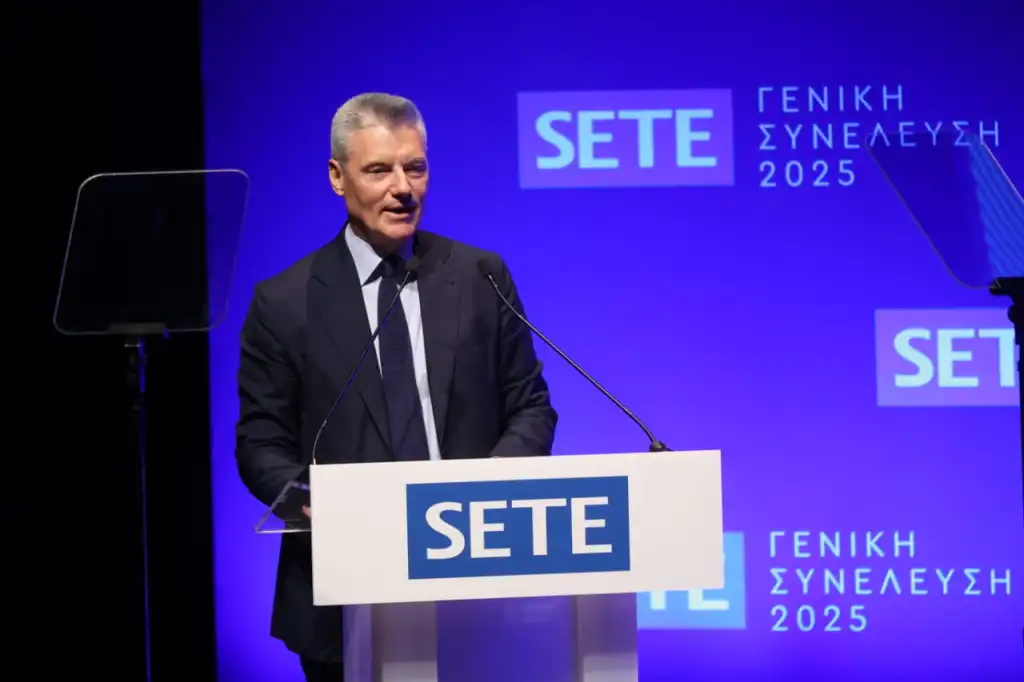“The past year proved in practice that Greek tourism is not simply a strong sector of the economy, but constitutes its stabilizer,” emphasized SETE president Yiannis Paraschis during his speech at the Closed Session of the 33rd Regular General Assembly of SETE, highlighting that international arrivals (including cruise passengers) exceeded 40.7 million while tourism revenues for 2024 reached €21.7 billion, showing a 5.4% increase. “With a direct contribution of €30.2 billion in 2024, an amount corresponding to 13% of GDP, and significantly higher indirect total contribution to the country’s economy, tourism serves as a catalyst for the country’s economic development,” Mr. Paraschis specifically noted.
Presenting more numerical data for tourism, he emphasized the following: “84.4% of tourism receipts come from inbound tourism, which covers 71.5% of the goods trade balance deficit. Additionally, the sector supports 16.5% of employment, creating over 700,000 jobs at the peak of the tourist season, confirming its contribution not only to public revenues but also to the sustainability of the labor market.”
Regarding the digital work card, he noted: “We request that the implementation of the Digital Work Card be adapted to the specific needs of the sector, ensuring workers’ rights without undermining business functionality. We need modernization and adjustments to work arrangements such as split shifts, preparation times, breaks, etc., combined with targeted reskilling and upskilling programs, as well as more effective management of the transfer process to cover serious human resource shortages.”
Yiannis Paraschis: Full speech by the SETE president
Ladies and gentlemen,
I warmly thank you for your presence at the Closed Session of the 33rd Regular General Assembly of SETE. Our annual meeting is not simply an institutional milestone. It is the moment when the tourism sector gathers to assess challenges, evaluate achievements and, primarily, to collectively chart its course. The previous year confirmed the resilience of Greek tourism in an era of multiple upheavals and uncertainties. The geopolitical and economic instability of the period is not temporary.
It is now the new backdrop against which international developments unfold and therefore the environment in which we are called to develop as a tourism sector. The continuing war in Ukraine (which is why the Prime Minister had to urgently cancel his presence at today’s Open Session of our General Assembly and will be represented by Deputy Prime Minister Mr. Hatzidakis), the intensifying destabilization in critical Middle East regions, and US policies with the reintroduction of tariffs in strategic sectors constitute turning points. This new phase of geo-economic competition, as well as natural phenomena whether linked to the climate crisis or other geophysical factors as we experienced this year with Santorini, already affect tourism and will impact it much more in the future than might appear at first glance. Because tourism development depends on three volatile conditions: available income, geopolitical stability, and climate of confidence. In this new complex situation, Greece is called to redefine its position, always operating with awareness of international shifts.
“Tourism revenues for 2024 reached €21.7 billion”
The past year proved in practice that Greek tourism is not simply a strong sector of the economy, but constitutes its stabilizer. Our sector expanded its footprint, confirmed its contribution and substantially supported the social and macroeconomic balance of the country. Specifically, international arrivals (including cruise passengers) exceeded 40.7 million, a performance that reflects both the maintenance of strong demand and the ability of Greek businesses to meet increased requirements. Overall, tourism revenues for 2024 reached €21.7 billion, showing a 5.4% increase. With a direct contribution of €30.2 billion in 2024, an amount corresponding to 13% of GDP, and significantly higher indirect total contribution to the country’s economy, tourism serves as a catalyst for the country’s economic development.
84.4% of tourism receipts come from inbound tourism, which covers 71.5% of the goods trade balance deficit. Additionally, the sector supports 16.5% of employment, creating over 700,000 jobs at the peak of the tourist season, confirming its contribution not only to public revenues but also to the sustainability of the labor market. Similarly now, for 2025 the messages continue to be positive and this is documented by INSETE and Bank of Greece data, according to which from the beginning of the year until early June, international air arrivals show an increase of +7% compared to 2024.
In terms of travel receipts, during January-March 2025 period, they reached €1.073 billion with an increase of +4.4% compared to the corresponding period of 2024. At the same time, airline seat scheduling for March-October 2025 shows an increase of around 5.3%, which makes us cautiously optimistic but always careful in our estimates.
Spatial planning is the foundation for sustainable development
Because behind the positive assessment, both of last year and this year’s estimates, there are complex and urgent challenges which already cast their shadow and will affect us even more from 2026 onwards and which we cannot ignore. In this environment, SETE’s priorities and demands for 2025 are clearly defined and based on continuous institutional dialogue with relevant Ministries, and position formation in cooperation with our sectoral associations and the entire sector.
And I start with issues concerning tourism product competitiveness. Perhaps the most important structural issue that remains pending and affects investments and competitiveness is Spatial Planning. Spatial planning is the foundation for sustainable development and legal certainty. The institutionalization of the Special Spatial Framework for Tourism which remains pending is absolutely necessary for a clear and stable framework for tourism investments. Parallel harmonization with Local Urban Plans is required to avoid contradictions and arbitrary interpretations that create insecurity and distortions. Without legal certainty, serious investments will not be implemented and destination carrying capacity will be at risk.
Regarding short-term rentals: Short-term rental has become a global trend competing with traditional hotels. In our country, according to INSETE data, the number of short-term rental beds probably exceeds that of hotels during peak season. This uncontrolled development of short-term rentals in several areas of the country has caused distortions both in the tourism experience and in residents’ daily lives. Government initiatives, particularly by the Ministry of Tourism, on this issue in recent years are noteworthy. However, SETE maintains a firm position in favor of a robust regulatory framework that separates professional from private activity, ensures tax equivalence, promotes efficient exploitation of available land and protects housing and social cohesion. We have submitted specific positions on specifications, taxation and necessary controls for accommodations offered through digital platforms.
The imposition and successive increases of the Resilience Fee, the increase in tourist tax without meaningful consultation and without clear reciprocity highlighted a deeper problem: the need for more predictable, fair and participatory tax policy for tourism. SETE calls for redesigning related policies to ensure that every burden measure returns significantly to local communities, strengthening local infrastructure in areas hosting visitors.
During this period we are preparing with INSETE and PWC a study to document and highlight the competitiveness deficit arising from the overall taxation of the Greek tourism product compared to our Mediterranean competitors. We seek a redesign of taxation and burdens aimed at rationalization and restoring balance between fair and proportional tourism participation in fiscal burdens and financing actions related to climate crisis adaptation, without jeopardizing sector competitiveness.
As we have repeatedly emphasized and specifically proposed with the Greek Tourism 2030 Study – infrastructure upgrading is crucial for tourism product competitiveness and sustainability. While private investments are running, we are lagging in public infrastructure upgrading. We need targeted interventions in ports, marinas, road networks, water supply, sewerage, waste and energy management.
Fee reciprocity must ensure that related resources return to projects and services that enhance tourism destination quality.
Allow me to focus specifically on three characteristic examples:
-The need to upgrade port and other infrastructure that was so highlighted this year in Santorini’s global brand.
-The urgent need for Exhibition and Conference facilities at the level of our competitors at least in Athens and Thessaloniki if we want to lead in the high-yield MICE sector.
-But also the extremely critical air navigation services sector which needs system upgrades, additional personnel and clear assurance of productivity levels to avoid malfunctions and delays affecting two-thirds of inbound tourism traveling by air.
On green transition
Friends,
Sustainability issues are of great importance to us at SETE. The sector’s green transition requires immediate activation of financing tools that will support tourism businesses in adopting sustainable practices and technologies. In this field we place great emphasis, pursuing both institutional integration of sustainability in tourism policies and practical business support through the METRON Sustainable Tourism self-regulation initiative. In this journey, METRON gives tourism businesses the necessary tools to measure, improve and enhance their progress in sustainability indicators. We call on the entire sector, more businesses of every size and activity, to participate actively. Because the green and socially responsible transition of tourism is a common goal and urgent need.
And we move to the extremely critical labor market issue. As we have often emphasized, the great capital of Greek tourism is human resources. As a responsible social partner we support every state effort that ensures workers’ rights and promotes healthy labor relations in tourism. In this context we also support the work card. However, we request that Digital Work Card implementation be adapted to the sector’s specific needs, ensuring workers’ rights without undermining business functionality. We need modernization and adjustments to work arrangements such as split shifts, preparation times, breaks, etc., combined with targeted reskilling and upskilling programs, and more effective management of transfer procedures to cover serious human resource shortages. SETE, always in close and particularly constructive cooperation with the Panhellenic Hotel Federation, intervened systematically and substantiated on all critical labor issues.
And let me close the priorities and demands chapter with the financing issue. The backbone of Greek tourism is thousands of small businesses throughout the country. Limited access to financing remains one of the biggest problems these businesses face. In previous Development Law announcements and ESPA programs, the majority of tourism applications remained unfunded, creating a significant backlog of mature investment projects that have not proceeded. With the recently passed new Development Law, it is crucial to ensure that new resources and incentives will meet the needs and specificities of the tourism sector. Our goal is to see a Development Law truly friendly to tourism investment for both large but mainly small and medium enterprises.
Specifically, our positions include:
– increased support rates for small and very small tourism units, particularly in island and mountain areas,
– special support schemes for thematic and sustainable tourism,
– incentives for green transition and digital upgrading of tourism businesses,
– flexibility in eligible expenses and adaptation to sector specificities,
– support for investments extending the tourism season,
– as well as faster evaluation and disbursement of support.
It is important to emphasize, tourism cannot and should not be absent from central planning for the country’s sustainable development. In the new Development Law, even symbolically, explicit reference to tourism is absent from the preamble. For a sector contributing so significantly to the Greek economy, recognition of its role even at the narrative level for the productive model remains, in our opinion, absolutely necessary. With documentation, continuity and sense of responsibility, we demand an institutional environment that will recognize tourism not as an opportunistic development pillar, but as the foundation of the country’s productive and social cohesion.
Ladies and Gentlemen,
Tourism in Greece has learned to survive under difficult and adverse conditions for many years. Now, it must learn to transform. It is not enough to maintain very good performance, we must shape tomorrow’s standards. And this presupposes strategic choice. That is why we believe it is the right time to update the Greek Tourism 2030 Strategic Study. After all, we have already exceeded the 2030 arrival target with 40 million in 2024.
We have a great opportunity ahead to jointly chart the next day of Greek tourism, if we want:
– more revenue,
– longer duration in time,
– broader geographical distribution
– better environmental, social and labor footprint.
Now that the international environment is transforming in ways that will undoubtedly affect tourism, now that the European Union is drafting for the first time a Strategic Tourism Roadmap under the guidance of the Greek commissioner with focus on Europe’s competitiveness loss risk so clearly highlighted by the Draghi and Letta reports, Now is the time to invest in our strategic direction. And it is in all our hands -state, businesses, local communities- to turn it into collective benefit. Tourism’s future cannot be the product of complacency and logic that success is given. It will be the result of political choice, investment boldness and social responsibility. It will not come because we deserve it, it will come because we will build it.
SETE must lead the dialogue for the next day, offer solutions, build consensus and mobilize those who often find no voice: small entrepreneurs, workers, regions, local communities.
I close with an important observation. In tourism, numbers count. But they do not exhaust the meaning. The most substantial measure is trust. The trust built between the State and investor, between business and customer, between local community and visitor. And this trust —in an era of multiple crises— is the strongest infrastructure we can build. Tourism is Greece’s most open, outward-looking encounter with the world. Let us ensure this encounter becomes more substantial each year, with greater added value for our country, for the Greek economy and society.




